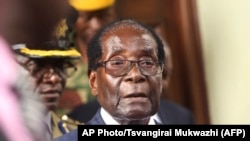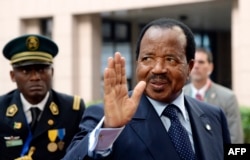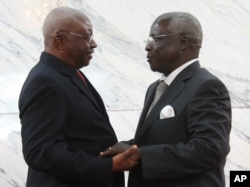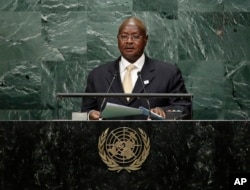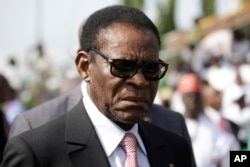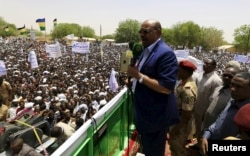All 10 of the world’s nations with the youngest populations are in Africa, according to United Nations statistics, giving the continent a median age of just under 20 years—or, roughly half the estimated median age of the United States, (37.9 years according to CIA estimates).
Yet, by latest count, at least eight African leaders have served in office for two decades, with an average age of 72.
“Why is Africa so saddled with leaders who ought to be enjoying their retirement in peace and quiet, instead of in the unforgiving political corridors, campaign trails and taxing political brinkmanship that challenge even the youngest leaders?” asked African politics scholar David Kiwuwa.
Kiwuwa, who teaches international studies at Princeton University, thinks that the willingness of many of the leaders to use violence to quash dissent is one key to their longevity. Kiwuwa, however, says “such leaders still attract reverence and unbridled loyalty from their supporters. Equally, being seen as 'fathers of the nation,' who led independence or liberation struggles, makes them irreproachable, irrespective of their shortcomings, extending their tenure.”
The result is that millions of African youth have known only one leader. In many cases, that leader is one who was born before the advent of social media and the internet—and, in the case of 92-year-old Robert Mugabe, before the invention of television, electric razors and automatic bread slicers.
One effect is that many youngsters, such as 15-year-old Harare resident Saymore Johns, say they’re not inspired to enter public service.
“That’s not something that’s encouraging the youths,” he said. “Because now, some of the youths, some of them want to be president, but then when they know that our president is still there, they won’t do anything about it.”
In Cameroon, opposition politician Ndansi Elvis is similarly disillusioned. He was born in 1983, the year after Paul Biya became president. Elvis says when the 83-year-old Biya speaks, it would appear that he knows a lot about modernization and digitalization, but in reality cannot keep up with his population.
“When young people use social media to send messages across to him and to let him know that, these are the problems they face, they call social media a weapon of mass destruction,” said Elvis. “So that’s very contradictory. That shows exactly that this is a president who has lost touch with reality of today…As to how I feel having one president in my entire life, I would say it’s disastrous. I feel like someone who has never experienced democracy. Because democracy, real democracy is when people can actually go to the polls for their leader and actually see the meaning of their vote.”
Many of these leaders are still lionized for their roles in bringing independence to their people. Mugabe is the only leader independent Zimbabwe has ever had—something that 21-year-old Tavaka Nhikwe finds commendable.
“Thirty-six years. That's a milestone,” he said. “I don’t think there is any president that has ever done that. That ought to be put in the Guinness Book of World Records. I really love that. Because it’s so... exotic.”
However, such political tenacity is anything but. Even in African nations that have seen leadership shifts, like Ghana, the new president, Nana Akufo-Addo, ran for the job in 2008 and 2012. Before that, he served as minister of foreign affairs and attorney general.
And it isn’t just the victors who have stuck around—many notable opposition movements have been led for decades by the same man.
Mozambique's Afonso Dhlakama has led the opposition Renamo since 1979 and runs for president at every contest. Étienne Tshisekedi, opposition leader in the Democratic Republic of Congo, founded his party in 1982, serving as prime minister on three occasions in the 1990s and featuring prominently in several presidential elections. He is 84.
In Uganda, 60-year-old opposition leader Kizza Besigye ran unsuccessfully in the 2001, 2006, 2011 and 2016 presidential elections. He lost every one of those polls to the man who has led Uganda since 1986, Yoweri Museveni. In South Africa, 88-year-old Mangosuthu Buthelezi founded the Inkatha Freedom Party in 1976, helping form South Africa's post-apartheid government in the 1990s, He's remained a fixture in parliament ever since.
Analyst Stephanie Wolters, head of the peace and security research program at the Pretoria, South Africa Institute for Security Studies, says the big names in African politics aren’t the problem. The issue, she says, is the lack of strong institutions.
“It is something that really tells us about the kinds of political parties that we have in Africa, which are still very much centered on individuals, on big names, on leaders that have been around for a very, very long time and that haven’t really succeeded in building the kinds of structures, whether those are the institutional structures for their own parties and public participation in their parties, or even for succession within their parties,” he said. “And I think that’s a really big challenge we have on the continent today in terms of the political parties here.”
Here are 10 of Africa’s oldest and longest-serving leaders:
Equatorial Guinea’s Teodoro Obiang Nguema, 74; 37 years in power. Deposed his uncle in a coup in 1979.
Angola’s Jose Eduardo dos Santos, 74; 37 years in power. Says he will not stand for the next elections in 2018.
Zimbabwe’s Robert Mugabe, 92; 36 years in power. Won his first election in 1980 and was recently chosen as his party’s presidential candidate for 2018.
Cameroon’s Paul Biya, 83, who has spent 34 years as president, was previously prime minister. He removed term limits in 2008 by changing his nation’s constitution.
Uganda’s Yoweri Museveni, 72; 30 years as president. Recently won a fifth term in a hotly contested poll.
Swaziland’s King Mswati III, 48; 30 years as Africa’s last absolute monarch. Took the throne of the landlocked southern African nation at the age of 18 after his father’s death.
Sudan’s Omar al-Bashir, 72; 27 years in power. Seized power in a 1989 coup.
Chad’s Idriss Deby, 64; 26 years in power after taking the helm after the ouster of a dictator. Recently re-elected to a fifth term.
Republic of Congo’s Denis Sassou Nguesso, 73; served as president for 19 years, but was also prime minister from 1979 to 1992.
Democratic Republic of Congo’s Joseph Kabila, 45; 15 years as president. Took power in 2001 after the assassination of the president, his father. His second presidential term was set to expire Dec. 20, 2016, but he has not set a date for new elections.
Sebastian Mhofu from Harare and Moki Edwin Kindzeka from Yaounde contributed to this report.




